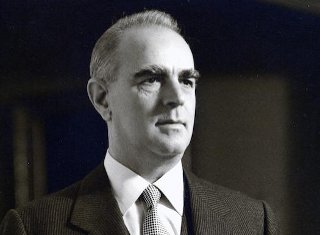Also known as:
Konstantinos Karamanlis, Κωνσταντίνος Καραμανλής
More People of Greece
More Topic Categories
Related Destinations
Constantine Karamanlis (08/03/1907 - 23/04/1998)
 Constantine Karamanlis was a Greek politician, a four-time Prime Minister and twice President of Greece.
Constantine Karamanlis was a Greek politician, a four-time Prime Minister and twice President of Greece.He was born in Proti, near Serres, and had six siblings. He attended school at his home town, and later Serres and Athens. He studied law at the University of Athens and received his degree in 1929. He started working as a lawyer in Serres, but in 1932, he decided to get in politics. He was elected Member of the Parliament in 1935, under the People’s Party, as well as in 1936, the last elections before World War II. That was the year when Metaxas declared his dictatorship.
After World War II, in 1946, he was reelected and sent to USA, not only to participate in discussions concerning Greece’s financial needs, but also because of his personal health problem, poor hearing. In the following years, he became Minister of Labour, Transportation and Social Welfare. In 1951, he married Amalia Kanellopoulou. Later, he became Minister of Public Works at the government of Prime Minister Alexandros Papagos; when the latter died in 1955, King Paul immediately proposed Karamanlis for the position, bypassing other more experienced politicians of the party. Karamanlis was reelected in the elections of 1956, having reorganized his party and having renamed it National Radical Union (ERE). This election and the one that followed in 1958 were controversial and the subject of numerous debates worldwide, as they were considered rigged. In 1962, Karamanlis signed an Agreement pursuing the Greek membership in the European Economic Community (EEC), a precursor of the European Union. Thus, the economic isolation of Greece ceased to exist, along with its dependence on US aid through NATO. Greece was actually the first European country to become an associate member of the EEC outside its six core members (Germany, France, Italy, Belgium, Luxemburg, and the Netherlands). This agreement was suspended in 1967, with the rise of the Regime of the Colonels.
In July 1963, he resigned from his position after a dispute with King Paul, because he wanted to revise the constitution and render it more democratic. He went abroad and returned for the elections of November, which he lost to George Papandreou and the Centre Union party. Once again, he left from Greece. After the fall of the Regime of the Colonels, he returned on 24 Jily 1974 and became Prime Minister, creating a coalition government, in order to settle the Cyprus crisis and restore democracy. He legitimized the Communist party; he intervened to change the capital penalty given to the colonels to life imprisonment; he conducted the referendum of 1974, abolishing monarchy and installing Presidential Democracy; and he promoted the matter of the Greek membership at the EEC.
In 1974, he founded the New Democracy party, winning the elections of 1974 and 1977. In 1980, he resigned after Greece became member of the EEC, but the real reason was the looming defeat at the elections by Andreas Papandreou. He was elected President in 1980 until 1985, and was reelected in 1990. In 1995, he withdrew from politics, and died a few years later, in 1998. Karamanlis is acknowledged for the restoration of Democracy, the establishment of presidential democracy, as well as the legalization of the communist party. He was also praised for the trials of the members of the junta, as well as for the part he had for the European membership of Greece.
See Also:
 Athens Photos
Athens Photos
 Santorini Photos
Santorini Photos
 Crete Photos
Crete Photos
 Meteora Photos
Meteora Photos
 Corfu Photos
Corfu Photos



